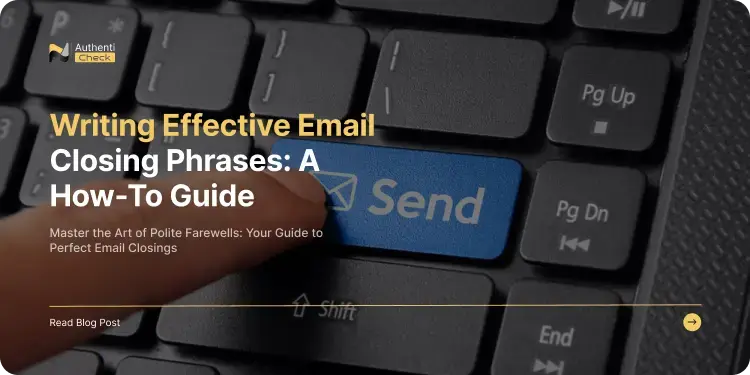
Writing Effective Email Closing Phrase: A How-To Guide
The closing of an email is your final chance to leave a lasting impression on the recipient. It’s more than just a formality; it can reinforce the tone of your message, reiterate a call to action, and express professionalism or friendliness, depending on the context. But with so many closing options available, choosing the right one can be tricky. Fear not! This guide delves into the world of effective email closing phrases, equipping you with the knowledge to craft the perfect sign-off for every situation.
Understanding the Importance of a Strong Email Closing Sentence
Think of your email closing phrase as the handshake at the end of a business meeting—it conveys courtesy, and professionalism, and leaves a lasting positive impression. A strong closing is crucial for several reasons. Firstly, it reinforces the overall tone of your email, ensuring consistency whether your message is formal or casual. For instance, a formal email requires a different closing than a more relaxed one, aligning with the intended mood.
Moreover, a clear and concise closing prevents any confusion about the next steps or the response you expect from the recipient. Keeping it brief and to the point helps maintain clarity and avoids miscommunication. Lastly, a well-chosen closing reflects professionalism and fosters trust, which is especially important in business communication. By thoughtfully crafting your email closing, you enhance the recipient’s perception of your message and strengthen your professional rapport.
Choosing the Right Closing Phrase: A Guide
The ideal email closing sentence depends on the context and recipient of your email. Here’s a breakdown of common email closing scenarios:
Formal Emails:
- To someone you don’t know well or are in a superior position:
- Sincerely,
- Regards,
- Respectfully yours,
- With kind regards,
- Following up on a previous email:
- Thank you for your time and consideration.
- I look forward to your response at your earliest convenience.
- Please let me know if you require any further information.
- Expressing gratitude:
- Thank you for your time and assistance.
- I appreciate your prompt attention to this matter.
Informal Emails:
- To colleagues or acquaintances:
- Best,
- Thanks,
- Talk soon,
- All the best,
- Following up on a casual request:
- Just checking in!
- Hope to hear from you soon.
- Let me know if you have any questions.
Additional Considerations
- Relationship with Recipient
The nature of your relationship with the recipient significantly influences the formality of your closing. A closer, more familiar relationship permits a more informal closing phrase, whereas a more distant or professional relationship necessitates a formal tone.
- Purpose of the Email
The email’s objective dictates the level of formality in your closing. For instance, a formal closing is more appropriate when requesting information, while a brief update can be closed more casually.
- Level of Urgency
The urgency of your email affects the closing phrase. If a swift response is needed, phrases such as “Looking forward to your reply” or “I look forward to hearing from you soon” effectively convey the need for prompt attention.
Beyond the Basics: Advanced Closing Techniques
- Company Signature
Ensure your email includes your organization’s standard signature, providing additional contact details and maintaining a professional appearance.
- Call to Action
In your closing, prompt the recipient toward the response you desire. Examples include, “Please let me know if you have any questions,” or “I look forward to scheduling a meeting at your convenience.”
- Adding a Personal Touch
For regular collaborators, adding a personal touch to your closing can strengthen your professional relationship. Consider something like, “Best regards, [Your Name].”
Avoiding Common Closing Pitfalls
When composing formal emails, avoiding common closing pitfalls is essential to maintaining professionalism. Firstly, refrain from using informal closings such as “Later” or “TTYL,” as these are inappropriate for business communications. Opt for professional closings that suit the formal tone. Secondly, avoid generic closings like “Thanks,” which lack personality. Instead, choose a closing that aligns with the specific purpose of your email.
While “Sincerely” is a reliable choice, consider varying your closings with alternatives like “Regards” or “With kind regards” for added variety. Lastly, avoid excessive closings; using multiple phrases such as “Thanks, Best, Sincerely” can seem redundant and cluttered. Stick to one well-chosen closing phrase for clarity and professionalism.
Also Read: Challenges Arising from Disposable Emails
Beware of Fake Emails and Disposable Emails
Before crafting your closing phrase, it’s essential to verify the legitimacy of the recipient’s email address to avoid potential scams. Fake email verification services like authenticheck.co can assist in this process by checking for several indicators of a fraudulent email.
These services identify email addresses associated with known disposable email providers, which are often used for one-time signups or to mask identities. They also validate if the email domain (e.g., “@example.com”) genuinely exists and compare the email address against blacklists of known spammers. Utilizing a free disposable email address checker can help ensure that you do not send sensitive information to illegitimate recipients, thereby safeguarding your communications.
Conclusion: The Power of the Perfect Closing
By mastering the art of crafting effective email closings, you can elevate your communication and leave a lasting positive impression on your recipients. Remember, the closing is your final opportunity to project professionalism, express gratitude, or reiterate a call to action. So, take the time to choose the right closing phrase for each email and watch your communication skills soar!